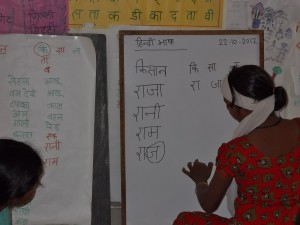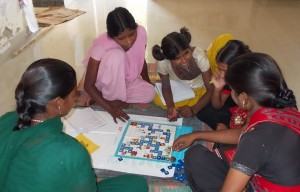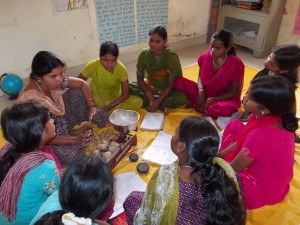Adolescents Education Project supported by Tata Social Welfare Trust
Education project for Education and development of Adolescents has been initiated with first time partnership with SDTT (financial assistance from Tata Social Welfare Trust). For Lokmitra it has been an important development as this was highly required for the development of Deeh & Chattoh blocks of Raebareli district. Lokmitra had previous experience of working in Deeh and had recently initiated work in Chhatoh for school improvement. Given the scale of need of Out of School Adolescents, a more concerted & long term effort was required.
Project started with the goal to educate and enable out-of-school adolescents, and to nurture their creative energies in a positive environment. The objectives are as follows –
- Out of school children in the age group of 11 to 16 are provided suitable residential and other education support so that they are able to move ahead to avail formal education of up to secondary level and realize their potential for development.
- Adolescents become self-aware and develop life skills for effective engagement in social, economic and political life. Some adolescents grow as social change facilitators.
- Provide support to other potential and emerging CSOs for effective engagement in promoting education of children and being able to support the development of adolescents.
- Improve governance of 50 schools with effective role of School Management Committee and leadership of Head Teacher so that children and adolescents get quality education with good attendance.
- Promote forums of adolescents and women in all project villages for their empowerment and entitlements to basic services
As Lokmitra had long experience of working for learning of school and out of school children, not much initial preparation was required. Lokmitra had a pool of experienced staff that could be deployed in this project. As SRTT supported project was coming to end, staffs were redeployed in phased manner. Some critical work like baseline preparation, initiation of Learning Centers was done in time. However organizing Residential Camps was new activity for the organization. An extra amount of energy was spent on preparation of camp organization and conduct of first camp for adolescent girls. Subsequently, things have eased up. Finding suitable place for conduct of camp was a real challenge. Slowly and in timely manner this was solved through support of local community. Lokmitra has been able to involve community in various ways and for all main activities. In initial stage, participation from Muslim Community has been less. But participation from SC community has been high.
Program got some support with engagement of two interns of Tata Administrative Services They gave valuable support to Lokmitra team. They used video movies, which helped in enhancing understanding of girls & boys. One ICICI fellow also got attached but since he hailed from southern states of India and had language problem, hence the team could not get desired support. However, his help was obtained in simplification of mathematical concepts through example or activities, which was found useful for learning by adolescent girls.
During the first year, some activities such as short duration training, vocational & printing work etc. were not taken up as they will follow after completion of some other activities. Four two months residential camps were proposed but only three camps could be organized during the reporting period.
Mahila Manch, Kishore Manch and Kishori Manch are in their beginning stage and is expected to strengthen in next year. Work related to betterment of schools could get initiated at later stage. Prior knowledge and publication material was useful in efforts towards this.
The organization has drafted its HR Policy on sexual harassment (under Vishakha Guideline). Advices of two external consultants (one woman) have been obtained. Discussions have taken place with senior members of the project team during March with regard to the policy. Child Protection Policy is being developed and it is expected to be adopted in first quarter of next year.
Outcome & Impact
Adolescent girls who have completed four months of residential camps, are developing dreams of their own development as well as development of their village. They want to complete education till XIIth. The residential camp participants feel proud to share their experiences with their parents. They can express their feelings, opinion, understanding in number of ways, like story, poetry, theatre, drawing, etc.
 Adolescent (boys & girls) are able to overcome unfounded fears from superstitious believes as they are able to reason out logically. Adolescents are now taking more care of their own health and cleanliness. About 20 boys have reduced chewing tobacco, smoking Bidi, Ganja. This was possible after much persuasion and efforts in creating understanding at individual levels.
Adolescent (boys & girls) are able to overcome unfounded fears from superstitious believes as they are able to reason out logically. Adolescents are now taking more care of their own health and cleanliness. About 20 boys have reduced chewing tobacco, smoking Bidi, Ganja. This was possible after much persuasion and efforts in creating understanding at individual levels.
They have developed ability to work in groups. Girls have started sharing advices among themselves. Girls have developed positive attitude towards people of other religion, caste or physically challenged etc. Girls celebrated festivals of Bakrid, Dusshera and Ramnavmi in Camps. Girls have improved in mannerism, they no longer use any sort of abusive language in their conversations.
Adolescents (boys & girls) interest in education has increased. Adolescents are able to talk with parents regarding their studies and self development. The Adolescent girls and boys talk about social issues such as caste, marriage etc. with their family members at the village. Adolescents are able to talk to their family in village on social issues (caste, child marriage, dowry etc.)
Parents are making effort to give their wards opportunity for study. For example, guardians in the areas of Pure Vanshi, Mau, Pure Bakshi and Medapur have been discussing with organization functionaries during meetings as to how to provide opportunities to their wards. Some parents have given extra time for encouraging other parents. Such as mothers of two adolescent girls of minority community (both of them had taken part in Residential Camp) encouraged other guardians to send their adolescent wards to the camp continuously for two days along with organization functionaries.
Parents in Mau and Pure Vanshi talk about acceptable marriage age of girls to be eighteen and strict adherence to it. Guardians are now also taking care of nutrition and health of their adolescent children. In Mau, guardian of Shehnaj and in Medapur, guardian of Aaarti are now talking with organization functionaries. Whereas some guardians inspire other guardians for better organization of camps, their proper management, attachment and full time involvement of adolescent girls.
There has been late start in engaging with schools. In four schools there is positive response from teachers for betterment of schools. There is some acceptance to proposed working methodology for school improvement. Cluster Coordinator of three Cluster Resources Centers (Mau, Nasirabad, Bhuwalpursisni) are demanding for support in organizing teachers’ peer learning meetings (as mandated under new framework of SSA).
Lokmitra had suggested & demanded from the government that Survey and Enrollment of Out of school children be carried out during the May-June, instead of July August so there is proper start of school session. Government has issued a letter directing that during “School Chalo” campaign be done in the period April 15th to 30th May, out of school children should be surveyed and enrolment should be completed by end May.
Output
- In the first round of baseline survey of 25 villages in 10 Gram Panchayats of the operational area, there were 2,718 adolescents in the age group of 11 to 20, (1,240 girls). Out of them, 572 adolescents were school drop-outs (231 girls). Other 305 adolescents (140 girls) never went to school. Among Muslim adolescents, 122 adolescents (54 girls) out of 281 were out of school.
- As a part of baseline, FGD was done in about 15 villages of Chattoh & Deeh on various issues like education, Gender disparity, political participation and health. About 200 Women and 44 men participated.
- 445 adolescents (140 girls) were enrolled with 10 centers, out of which 102 (39 girls) were later enrolled with formal schools. Average attendance at the education centre during the reporting was between 50% and 57%. Learning of children has improved considerably, especially in Hindi language.
- Two Camps (each of 2 months) for adolescent girls were organized in which total 52 adolescent girls participated. In total 27 girls completed four months of camp and 25 completed two months of camp. After completion of 2 and 4 months camps, 17 Girls can read and write (in their own words) their experiences, any prose or poetry. In addition to them 13 others can read a paragraph, make sentence on their own.
- Adolescent boys’ two month residential camp was organized in which 50 boys enrolled. Out of them, 43 boys completed the camp (33 SC, 6 OBC and 4 Minority). After completion of 2 months camp 14 Boys can write their experiences (in their own words) and read any prose or poetry. 12 can read a paragraph, write it or can make sentence on their own.
- In adolescent Boys Camp, regular morning session on Yoga and physical exercises was undertaken by a guardian Ram Bahadur voluntarily. All education centers and residential Camps are are being conducted in places made available by the community.
- Women day Program was organized on 9th March in Deeh block. There were about 370 participants in total from Deeh and Chattoh block. Apart from 225 women, there were 45 men and 100 adolescent girls as participants. It was a day for coming together for them to express their solidarity for women’ right and getting aware on social issues and entitlements.


